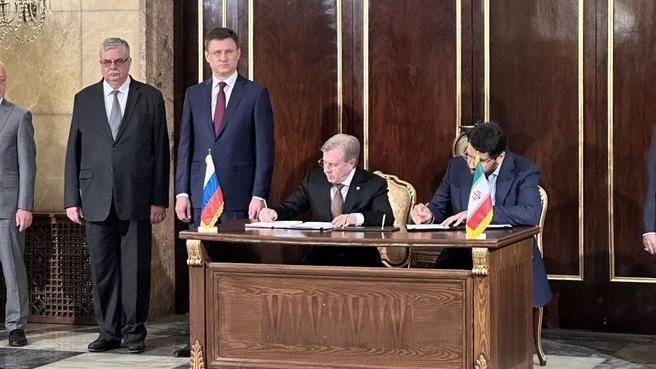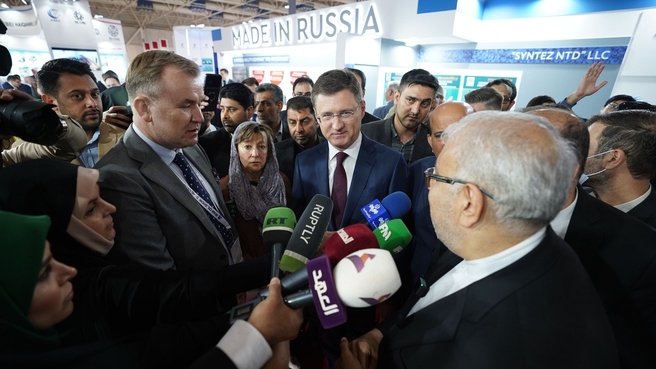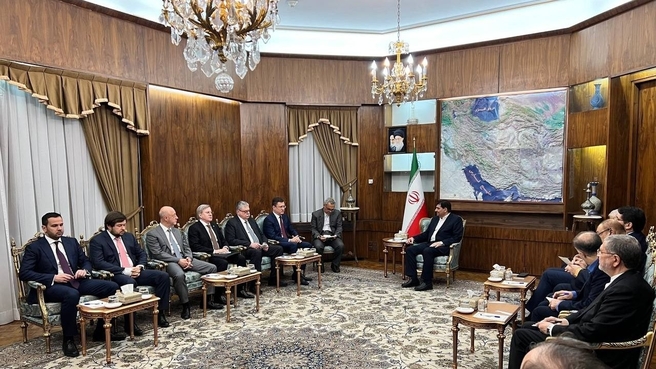Alexander Novak’s working visit to Iran. Signing ceremony for an intergovernmental agreement with Iran on cooperation in the construction of the Rasht-Astara railway line in Iran
During the second day of his working visit to Iran, Deputy Prime Minister of the Russian Federation Alexander Novak attended the signing ceremony for an agreement on cooperation in the construction of the Rasht-Astara railway. He spoke at the opening ceremony of the 27th Iran International Oil, Gas, Refining & Petrochemical Exhibition, and had a number of bilateral meetings.
President of Russia Vladimir Putin and President of the Islamic Republic of Iran Ebrahim Raisi took part, via videoconference, in the signing ceremony for the intergovernmental agreement between Russia and Iran on cooperation in financing the design, construction and supply of goods and services for the Rasht-Astara railway line in Iran, aimed at boosting transportation via the International North-South Transport Corridor.
“The unique North-South transport artery, due to include the Rasht-Astara railway line, will help considerably diversify global transport flows. Traffic via the new corridor will possess substantial competitive advantages. For example, it will take about 10 days to deliver consignments from St Petersburg to Mumbai. I would like to note, as a comparison, that it takes 30 to 45 days to deliver them using traditional commercial routes. In effect, this makes it possible to slash delivery deadlines and costs,” Vladimir Putin said during the ceremony.
The international North-South transport corridor was initiated in order to move forward Russia’s strategic partnership with the Caspian Sea countries and to organise Northern and Western Europe’s transit link with the South Caucasus, the Persian Gulf and South Asia.
“This agreement is critically important and allows us to move to a whole new phase of cooperation in the transport field,” Alexander Novak said after the agreement had been signed. “The next phase includes the construction of a 162 km-long Astara-Rasht railway line, which will close the railway loop going across Russia, Azerbaijan and Iran from Ust-Luga and St Petersburg to the port of Bandar Abbas in the Persian Gulf. After this project goes live, we will have a through route for transit shipment of goods to Europe and the Persian Gulf. In fact, this represents a global change in supply chains. Once the project becomes operational, Russia-Iran cargo turnover by rail will increase to at least 15 million tonnes per year in terms of transit cargo with an option to expand. This project can offer an alternative to the Suez Canal.” The ceremony closed with a protocol meeting between the Russian Deputy Prime Minister and President of Iran Ebrahim Raisi.
Alexander Novak toured the booths of the Iranian and Russian participants of the 27th Iran International Oil, Gas, Refining and Petrochemical Exhibition.
“Twenty-eight Russian companies have their products on display at the Russian Export Centre under the Made in Russia national brand, as well as a booth titled “Made in Bashkiria” operated by the government of the Republic of Bashkortostan with 10 Bashkir companies’ products on display. We plan to continue to inform the business community about Russian and Iranian products and the potential for mutual trade, including at industry-specific exhibitions,” Alexander Novak said in his opening remarks at the 27th Iran International Oil, Gas, Refining and Petrochemical Exhibition.
The Deputy Prime Minister held a working meeting with the Co-Chair of the Intergovernmental Commission on Trade and Economic Cooperation between the two countries, Iranian Petroleum Minister Javad Owji. The talks focused on improving customs cooperation, cooperation in trade, industry, engineering in the fuel and energy sector, agriculture, pharmaceuticals, shipping and aircraft construction, as well as establishing the Russian Export Centre in Iran. The parties also discussed the preparation of a Free Trade Agreement between the EAEU and Iran.
The dynamics of trade between the two countries indicates convergence of their positions and growth of economic cooperation. In 2022, trade between Russia and Iran increased by 20.2 percent and came close to $5 billion, a record figure in recent history. The parties noted the joint intensive work on the draft of a new large interstate agreement, which is nearly ready. A number of bilateral documents were signed during the meeting.
At the end of his visit, Alexander Novak held a working meeting with First Vice President of Iran Mohammad Mokhber, during which the officials discussed economic, financial and banking cooperation and joint work in transport, infrastructure projects and nuclear energy.
Alexander Novak also took part in the closing ceremony of the Russia-Iran Energy Business Forum, which was attended by about 100 fuel and energy companies.










